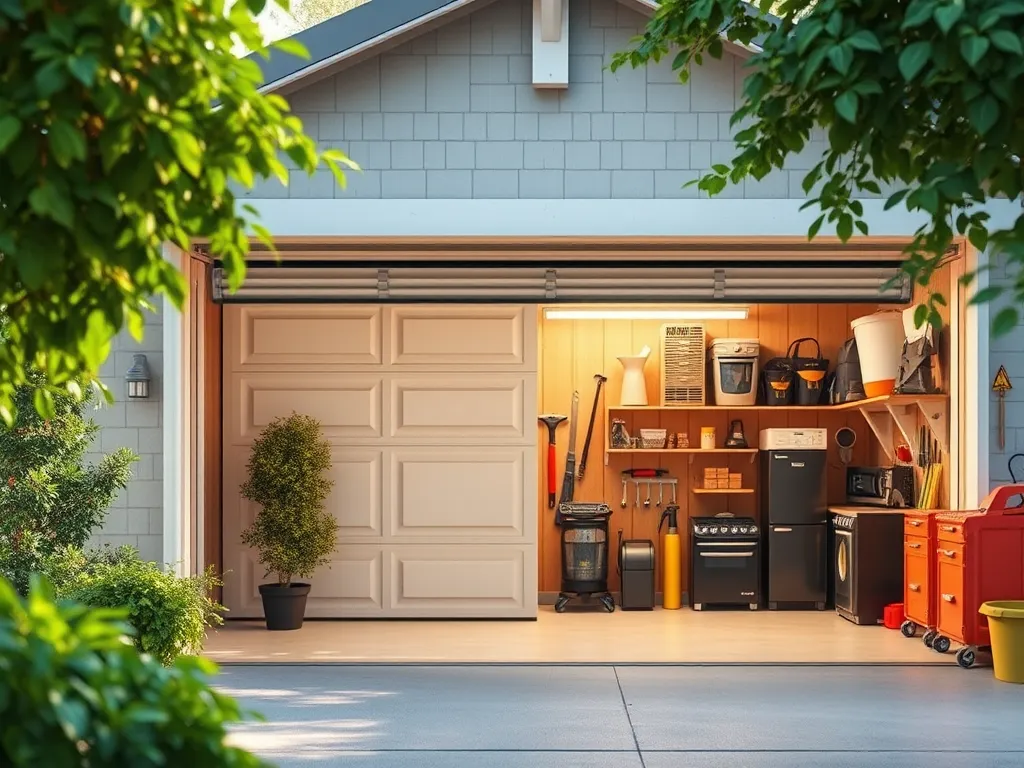Maximize Your Garage Door Energy Efficiency Today!

Understanding Garage Door Energy Efficiency
Garage Door Energy Efficiency is a crucial aspect for homeowners looking to enhance their energy savings and improve their home's overall performance. A garage door is often one of the largest openings in a home, and its insulation properties can significantly affect the energy cost associated with heating and cooling inside the house.
The r-value importance in garage doors should not be overlooked for optimal insulation.
When considering Garage Door Energy Efficiency, it's important to focus on the types of materials used, the insulation value of the garage door itself, and how well it seals against air leaks. A well-insulated garage door can help maintain internal temperatures and reduce the energy needed for heating and cooling, which lowers the total energy consumption.
Additionally, the efficiency of a garage door can impact not just energy costs, but also the comfort of the spaces around the garage. Ensuring that the garage door is energy efficient can lead to a more consistent climate in the garage and adjacent rooms, making it more enjoyable and usable throughout the year.
Moreover, enhancing Garage Door Energy Efficiency can also increase the property value. Buyers are often looking for homes that possess energy-saving features, and an efficient garage door can be an attractive selling point.
In summary, striving for Garage Door Energy Efficiency is beneficial not only for reducing energy bills but also for improving overall living conditions and increasing the market appeal of a property.
Benefits of Garage Door Energy Efficiency
One of the primary advantages of having an energy-efficient garage door is lower energy bills. With better insulation and sealing, less energy is required to keep the garage and connected spaces comfortable. This can result in significant savings on heating and cooling costs, especially in extreme weather conditions.
Implementing effective weatherstripping techniques can significantly reduce energy costs.
In addition to cost savings, energy-efficient garage doors improve home comfort through better insulation. A well-insulated garage door creates a stable temperature environment, reducing drafts and cold spots, allowing homeowners to enjoy their garages year-round, whether for parking cars or as a functional workspace or recreational area.
Furthermore, investing in an energy-efficient garage door can increase property value. Potential homebuyers are increasingly drawn to energy-efficient features, and having a well-insulated, high-performance garage door can make a home more appealing than others on the market.
To choose the best option for your home, understanding different garage door insulation types is essential.
Ways to Improve Garage Door Energy Efficiency
Installing insulated garage doors is one of the most effective ways to enhance Garage Door Energy Efficiency. Insulated doors often have a core of polyurethane or polystyrene foam, which provides excellent thermal resistance and helps keep temperatures stable.
Another simple method to improve energy efficiency is sealing gaps and cracks around the garage door to prevent air leaks. Weatherstripping and caulking can be utilized to create a tighter seal, blocking cold drafts in winter and heat in summer from infiltrating the garage.
Upgrading to energy-efficient garage door openers can also contribute significantly to energy savings. Many modern openers come with features like standby power systems that consume minimal electricity when not in use, as well as smart technology that allows homeowners to monitor and manage energy usage remotely.
Impact of Weather on Garage Door Energy Efficiency
Weather conditions play a significant role in Garage Door Energy Efficiency. Extreme temperatures can influence the performance of a garage door, causing it to expand and contract, which may lead to gaps and compromised insulation over time.
Using weatherstripping is an effective solution to combat cold air infiltration into the garage. Properly installed weatherstripping can close off gaps and ensure that the interior remains insulated against the weather outside, thus enhancing overall energy efficiency.
Regular maintenance is also vital for maintaining energy efficiency. Routine inspection of mechanisms, seals, and insulation can identify potential problems before they worsen, ensuring that the garage door performs efficiently throughout the seasons.
Technological Innovations in Garage Doors
Smart garage door openers are a significant innovation in the pursuit of energy management. These devices not only provide convenience but also allow for greater control over when and how energy is used, helping homeowners to optimize efficiency.
Solar-powered garage doors are emerging as a sustainable option that can reduce reliance on grid electricity. These doors use solar panels to power operation, making them a green choice for eco-conscious homeowners.
The materials used in garage doors also play a significant role in energy efficiency. High-quality, energy-efficient materials can improve insulation levels and reduce heat transfer, thus contributing to better overall performance of the door.
Comparing Garage Door Materials for Energy Efficiency
When choosing between wood and steel garage doors, steel is generally considered more energy-efficient. Steel doors can be insulated more effectively and are also more durable against weather conditions, whereas wood may require more maintenance to prevent warping and damage.
Aluminum garage doors offer numerous benefits in terms of insulation, often incorporating multiple layers with insulation materials. They are lightweight, resistant to corrosion, and can improve energy efficiency in a variety of climate conditions.
Fiberglass garage doors are another noteworthy option. They typically offer an excellent balance of strength, weight, and energy efficiency, with good insulation capabilities and low maintenance requirements, making them an attractive choice for many homeowners.